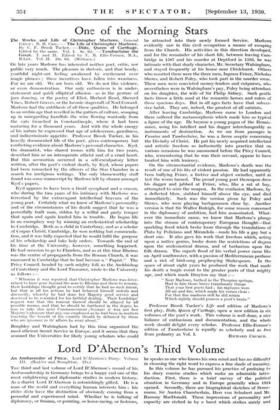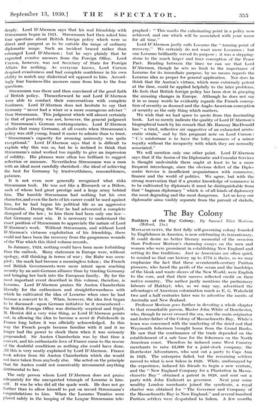Lord D'Abernon 's Third Volume
THE third and last volume of Lord D'Abernon's record of his Ambassadorship in Germany brings to a happy end one of the most enlightening and diplomatic studies in modern history. As a diarist Lord D'Abernon is astonishingly gifted. Ile is a man of the world and everything human interests him ; his ()biter dicta have the distinction of obviously coming from a powerful and experienced mind. Whether he is talking of diplomacy, or fmunce, or painting, or horse-racing, or fashions,
he speaks as one who knows his own mind and has no difficulty in choosing the right word to express a fine shade of meaning.
In this volume he has pursued his practice of prefixing to his diary concise studies which make an admirable intro- duction. First, there is a brief survey of the political situation in Germany and in Europe generally when 1924 opened. Secondly, there arc biographical sketches of Strese- mann, Sir Austen Chamberlain, Herr von Schubert and Mr. Ramsay MacDonald. These impressions of personality and capacity are etched in by a hand which strikes surely and
deeply. Lord D'Abernon says that his real friendship with Stresemann began in 1921. Stresemann had then asked him four questions about British foreign policy which were so direct and pungent as to be outside the range of ordinary diplomatic usage. Such an incident braced rather than estranged Lord D'Abernon ; but he says plainly that he expected evasive answers from the Foreign Office. Lord Curzon, however, was not Secretary of State for Foreign Affairs for nothing. As everyone knows, Lord Curzon despised.evasiteness and had complete confidence in his own ability to match any dialectical wit opposed to him. Accord- ingly four business-like answers came from him to the four questions.
Stresemann was there and then convinced of the good faith of British policy. Thenceforward he and Lord D'Abemon were able to conduct their conversations with complete frankness. Lord D'Abernon does not hesitate to say that Germany " never had a wiser or a more courageous adviser " than Stresemann. This judgment which will almost certainly be that of posterity was not, however, the general judgment of Stresemann's German contemporaries. Lord D'Abernon admits that many Germans, at all events when Stresemann's policy was still young, found it easier to admire than to trust. " Stresemann's capacity for arousing animosity was quite exceptional." Lord D'Abemon says that it is difficult to explain why this was so, but he is inclined to think that Stresemann's mind worked too rapidly to give an impression of solidity. His phrases were often too brilliant to suggest reflection or measure. Nevertheless Stresemann was a man with an ideal most carefully cherished—the ideal of achieving the best for Germany by trustworthiness, reasonableness, patience.
It is not even now generally recognized what risks Stresemann took. He was not like a Bismarck or a Billow, each of whom had great prestige. and a large army behind him. The humble Stresemann had nothing but his own eharacter,and even the facts of his career could be used against him, for he had begun his political life as an aggressive Nationalist. During the War he had advocated a complete disregard of the law ; to him there had been only one law— that Germany must win. It is necessary to understand the exact position of Stresemann to appreciate the nature of Lord D'Abemon's work. Without Stresemann, and without Lord D'Abemon's virtuous exploitation of his friendship, there could not have been the recovery from the gangrenous wounds of the War which this third volume records.
In January, 1924, nothing could have been more forbidding than the outlook. Many statesmen in Europe were, without apology, still thinking in terms of war ; the Ruhr was occu- pied ; the mark had become a meaningless token ; the French and British Governments were more intent upon reaching security by an anti-German alliance than by trusting Germany and bringing her back into the European family. By far the most important event described in this volume, therefore, is Locarno. Lord D'Abernon praises Sir Austen Chamberlain liberally for the enthusiasm and straightforwardness with which he cultivated the idea of Locarno when once he had become a convert to it. When, however, the idea first began to be discussed—upon German initiative be it remembered— the British Foreign Office was distinctly sceptical and frigid. M. Herriot did a very wise thing, as Lord D'Abernon points out, in allowing the idea to become a secret de Polichenelle in France long before it was officially acknowledged. In this way the French people became familiar with it and it no longer had the power to shock them when it was seriously Propounded. Sir Austen Chamberlain was by that time a convert, and his enthusiastic love of France came to the rescue of the doubtful conditions as nothing else could have done. All this is very neatly explained by Lord D'Abemon. France took advice from Sir Austen Chamberlain which she would not have taken from anybody else. She acted on the principle that Sir Austen could not conceivably recommend anything detrimental to her.
The only person whom Lord D'Abernon does not praise adequately for the unexpected triumph of Locarno is him- self. It was he who did all the spade work. He does not go further than to allow himself to put on record Stresemann's congratulations to him. When the Locarno Treaties were placed safely in the keeping of the League Stresemann tele-
graphed : " This marks the culminating point in a policy now achieved, and one which will be associated with your name for all time."
Lord D'Abernon justly calls Locarno the " turning point of recovery." We certainly do not want more lAwarnos ; but one Locarno brilliantly served its purpose ; it was a stepping- stone to the much larger and finer conception of the Peace Pact. Reading between the lines we can see that Lord D'Abernon, though he sets no limit to the importance of Locarno for its immediate purpose, by no means regards the Locarno idea as proper for general application. Nor does he think that Sir Austen's virtues, which were extremely potent at the time, could be applied helpfully to the later problems. He feels that British foreign policy has been slow in grasping the amazing changes in Europe. Although he does not say it in so many words he evidently regards the French concep- tion of security as doomed and the Anglo-American conception of security as the only thing which matters.
We wish that we had space to quote from this fascinating book. Let us merely indicate the quality of Lord D'Abernon's biographical touch by his remark that Mr. Ramsay MacDonald has " a tired, reflective air suggestive of an exhausted aristo- cratic strain," and by this pregnant note on Lord Curzon : " C.'s misfortune is to have the lofty manners of a minor royalty without the incapacity with which they are normally associated."
We will mention only one other point. Lord D'Abernon says that if the fusion of the Diplomatic and Consular Services is thought undesirable there ought at least to be a more frequent interchange, since the obvious defect of the Diplo- matic Service is insufficient acquaintance with commerce, finance and the world of politics. We agree, but with the strong reservation that if a greater knowledge of commerce is to be cultivated by diplomats it must be distinguishable from that " bagman diplomacy " which is of all kinds of diplomacy the most degrading and the most dangerous. Let us keep our diplomatic aims visibly separate from the pursuit of shekels.











































 Previous page
Previous page